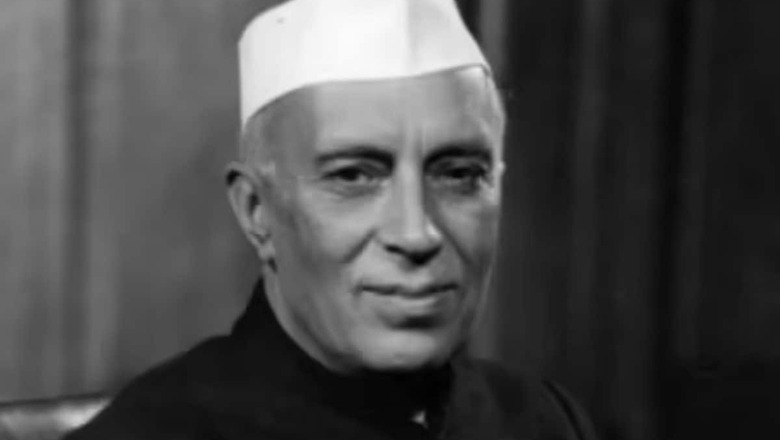
views
On December 16, 1952, Syama Prasad Mookerjee stood up in the Lok Sabha to remind Prime Minister Jawaharlal Nehru how his father Motilal had castigated the colonial government of India on September 14, 1929, at the same place, then known as the Central Legislative Assembly. Bengal revolutionary Jatin Das had breathed his last on September 13, 1929, in the Lahore jail after fasting for 63 days, demanding an improvement in the treatment of Indian political prisoners by the government.
Mookerjee quoted the words of the senior Nehru: “For days and days the news came that his life was ebbing away and that any moment he might breathe his last. The news came that there were hunger strikers who were in a precarious condition. What were the Government doing all the time? It is said, Sir, that Nero fiddled while Rome was burning. Our benign Government has gone one better than Nero. It has fiddled on the deathbed of this young man.”
Mookerjee was replying to a statement made by the prime minister on the floor of the House on the death of Potti Sriramulu, a Congressman, on December 15, 1952, after a 58-day fast demanding the formation of a separate Andhra state. The demand for an Andhra state carved out of the Madras province had been a long-standing one. Recognising the principle of linguistic organisation of provinces, the Congress under Gandhi had established separate provincial committees for Andhra, Tamil Nadu, Kerala and Karnataka even when the separate provinces did not exist. The principle was accepted, but implementation kept getting delayed.
The drafting committee of the Constitution had also considered mentioning Andhra as a separate province in the first schedule of the Constitution but dropped the idea because merely mentioning a new province was not enough. The creation of a new province needed a lot of preparatory steps, and therefore the drafting committee asked that a commission be set up to examine the issue and recommend the names of the new provinces which should be included in the first schedule.
Rajendra Prasad, the president of the Constituent Assembly accordingly set up a commission headed by S.K. Dar, retired judge of the Allahabad High Court, on June 17, 1948, to examine the formation of new provinces of Andhra, Karnataka, Kerala and Maharashtra. In its report submitted on December 10, 1948, the Commission, however, rejected the idea of forming new linguistic provinces.
The annual session of the Congress held in Jaipur in December 1948 set up its own committee, comprising Jawaharlal Nehru, Vallabhbhai Patel and Pattabhi Sitaramayya, to look into the issue. Arguing that the “first consideration must be the security, unity and economic prosperity of India and every separatist and disruptive tendency should be rigorously discouraged”, the JVP committee (known by the initials of the members) recommended postponing the formation of new provinces for a few years. However, it also pointed out that “if public sentiment is insistent and overwhelming, we as democrats, have to submit to it, but subject to certain limitations”. The report was accepted by both the Congress Working Committee (CWC) and the government.
Factors such as a lack of agreement on the location of the province’s capital, the need for a thorough assessment of the financial implications and also upcoming general elections, held back the formation of the new states. C Rajagopalachari, who had been reinserted into the politics of Madras as the state’s chief minister in April 1952, was against any move to form the new provinces. He was apprehensive that accepting the demand for a separate Andhra province would make it appear as giving in to the communists, who had performed very well in the elections, emerging as the second-largest party. However, the Andhra Provincial Congress committee passed a resolution in June 1952 asking the Central government to take immediate steps on the matter.
Yet, when a resolution in favour of a new Andhra state was moved in Rajya Sabha two weeks later, Nehru opposed it on the grounds of lack of agreement among the parties and diversion of significant financial resources to effect large-scale reorganisation.
Apart from the popular agitation, some prominent figures took to fasting. In May 1952, Swami Sitaram undertook his second fast in Cuddapah after his 36-day fast in August–September 1951. Nehru was not pleased. “I must say that Swami Sitaram has a peculiar way of doing the wrong thing and thereby exasperating people,” he wrote to V.V. Giri. It was the fast unto death undertaken by Sriramulu from October 19, 1952, that stirred the region. The fast, however, did not stir Nehru. In fact, his response became the guiding principle for the Indian State for the subsequent decades. “Some kind of a fast is going on for the Andhra Province,” Nehru wrote to Rajagopalachari on December 3, informing him that “I am totally unmoved by this and I propose to ignore it completely.”
“I realise that his death will be very unfortunate and may have serious consequences,” he wrote to Sri Prakasa, governor of Madras, a few days later. “But it is impossible for a Government to function under threats of hunger strikes.” “Bringing pressure of such a kind on very major decisions would, if acceded to, put an end to the authority of Parliament and democratic procedure,” Nehru told the Lok Sabha on December 8. The Speaker of the Lok Sabha repeatedly disallowed adjournment motions tabled by members of the parliament to discuss Sriramulu’s fast and the formation of the new state. Even on the next day, when reports of widespread disturbances, loss of life and destruction of railways and telecommunication properties came in, the Deputy Speaker disallowed any discussion on the ground that the matter concerned the local government. Nehru concurred.
It was in this context that Mookerjee reminded Nehru of Jatin Das’s death and Motilal Nehru’s intervention in the Assembly. What escaped Mookerjee’s memory perhaps was that Das’s adoption of the method of self-sacrifice was disparaged by the very man who had made fast unto death fashionable in Indian politics and claimed to be ‘an expert in fasting’; the man whose spiritual and political heir was the prime minister—Mahatma Gandhi. Nehru’s arguments were remarkably similar to the position taken up by Gandhi when the political prisoners in Bengal went on a hunger strike in 1939, demanding their release by the provincial government led by Krishak Praja Party’s Fazlul Huq. Despite widespread expression of public support for the political prisoners undertaking hunger strike, Gandhi declared: “I do feel very strongly that this fast is not justified. The strikers are giving a bad lead to those who are similarly situated. Such hunger-strikers, if they are largely copied, will break all discipline to pieces and make orderly government impossible…their refusal to give up the strike will embarrass the [Congress] Working Committee in whatever effort it might wish to make to secure their release.”
Not only was Nehru dismissive of Sriramulu’s form of protest, but he was extremely careful to insist that the hunger strike had no influence on the formation of the new state, although the decision was announced just four days after Sriramulu’s death. By a strange coincidence, this announcement could not be made during any of the 58 days during which Sriramulu fasted. On December 19, 1952, Nehru announced the decision to form the Andhra state ‘consisting of the Telugu-speaking areas of the present Madras state, but not including the city of Madras’. He made it a point to inform the chief ministers of all the states that this announcement was made as planned and was not influenced by Sriramulu’s death. The connection between the two could, however, be hardly removed from public perception.
This point was raised by J.B. Kripalani during the parliamentary debate on the report of the States Reorganization Committee on December 14, 1955. Kripalani said: “People also learnt a lesson from what happened in Andhra and it was a very bad lesson that they learnt. They thought that as soon as confusion was created, the Government came down and accepted what had been demanded. That was a very very bad precedent set and the Government could have been careful to see that no such impression was created.”
Taking special note of this allegation while preparing a summary of the discussions in the Parliament for Home Minister Kailash Nath Katju, the ministry officials recorded a long-winded rebuttal. The essence of the argument by the ministry was that the announcement was “substantially the translation into a decision of various announcements which had been made earlier. It cannot therefore be said that Potti Sriramulu’s death and the regrettable events which followed it led to the creation of Andhra.”
Chandrachur Ghose is author of the national bestsellers ‘1947-57, India: The Birth of a Republic’ (2023) and ‘Bose: The Untold Story of an Inconvenient Nationalist’ (2022), both published by Penguin. Views expressed in the above piece are personal and solely those of the author. They do not necessarily reflect News18’s views.




















Comments
0 comment